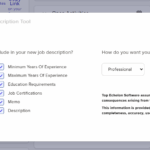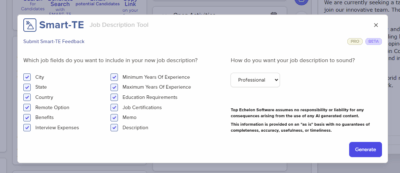As we begin 2024, professional recruiters and search consultants find themselves facing new challenges and opportunities. To enhance recruitment production in the current environment, it’s essential to reflect on the strategies and tools that have proven effective . . . and that’s exactly what we’re going to do with this article!
Specifically, we’re going to examine four key questions to guide recruiters towards achieving greater recruitment production in 2024: what overall approaches worked, which marketing approaches yielded results, which recruiting approaches proved effective, and what technology played a pivotal role. If you’re ready, let us begin.
1. What Overall Approaches Worked?
Recruitment is a multifaceted process that requires a holistic approach. To enhance overall productivity, recruiters need to evaluate the strategies that have yielded the best results in recent times.
Building Strong Talent Pipelines
One overarching approach that has consistently demonstrated success is the strategic building of talent pipelines. A talent pipeline is a pool of potential candidates who have expressed interest in a company or industry. Establishing and nurturing these pipelines proactively ensures a ready pool of candidates when positions open up.
Recruiters who have focused on cultivating relationships with potential candidates, even when no immediate opportunity is available, find themselves at a distinct advantage. This approach not only reduces time-to-hire but also improves the quality of hires by tapping into a pre-qualified talent pool.
Embracing Diversity and Inclusion
In 2024, the importance of diversity and inclusion in the workplace is more evident than ever. Successful recruiters have recognized the value of diverse perspectives and backgrounds, leading to an increased focus on inclusive hiring practices.
Companies that actively promote diversity and inclusion not only benefit from a broader range of skills but also create a more vibrant and innovative work environment. Recruiters who have championed diversity as a key component of their overall recruitment strategy have reported positive outcomes in both candidate satisfaction and organizational performance.
Continuous Learning and Adaptability
The recruitment landscape is dynamic, with new technologies, trends, and challenges emerging regularly. Successful recruiters have adopted a mindset of continuous learning and adaptability to stay ahead.
Investing time in staying updated on industry trends, attending relevant workshops, and participating in networking events has proven to be an effective approach. The ability to adapt quickly to changes in the recruitment landscape, whether related to technology or market demands, ensures that recruiters remain agile and competitive.
Leveraging Employer Branding
Building and promoting a strong employer brand has become a cornerstone of successful recruitment. Candidates today are not only looking for a job but also assessing the company culture and values. Recruiters who have actively worked on enhancing their organization’s employer brand find it easier to attract top talent.
Utilizing social media platforms, showcasing employee testimonials, and participating in industry events contribute to building a positive employer brand. Recruiters who have successfully aligned their recruitment efforts with a compelling employer brand have reported higher application rates and improved candidate quality.
2. Which Marketing Approaches Worked?
In the digital age, effective marketing is integral in terms of increasing recruitment production. Search consultants need to evaluate the marketing approaches that have yielded the best results in terms of candidate engagement and attraction.
Social Media Engagement
The role of social media in recruitment has evolved beyond simply posting job openings. Successful recruiters have harnessed the power of social media platforms to actively engage with potential candidates, showcase company culture, and share valuable industry insights.
Platforms like LinkedIn, Twitter, and Instagram have proven to be effective channels for building a strong online presence. Recruiters who have embraced social media not only as a recruitment tool but also as a means of building relationships with candidates report increased visibility and a more extensive talent pool.
Personalized Email Campaigns
Email remains a powerful communication tool in the recruitment process. However, the traditional mass-email approach is becoming less effective. Recruiters who have adopted personalized email campaigns, tailored to the specific interests and skills of potential candidates, report higher response rates and engagement.
Using data analytics and segmentation tools, recruiters can craft targeted email campaigns that resonate with their audience. This personalized approach not only improves the candidate experience but also increases the likelihood of attracting the right talent.
Video Marketing for Recruitment
Video content has become increasingly popular, and successful recruiters have leveraged this trend for recruitment purposes. Creating engaging and informative recruitment videos allows candidates to get a glimpse of the company culture, values, and expectations.
Recruiters who have embraced video marketing find that it adds a human touch to the recruitment process, making the organization more relatable to potential candidates. Video interviews, virtual office tours, and employee testimonials are powerful tools in attracting top talent in a visually-oriented digital landscape.
3. Which Recruiting Approaches Worked?
Recruiting approaches are at the core of the profession, and recruiters need to assess which methodologies have been most effective in attracting, assessing, and securing top talent. Because that is yet another way that you can increase recruitment production in 2024.
Data-Driven Decision Making
Data analytics has revolutionized the recruitment process. Recruiters who have embraced data-driven decision-making find themselves better equipped to identify trends, assess the effectiveness of different channels, and optimize their strategies.
Utilizing applicant tracking systems (ATS) and other data analytics tools allows recruiters to measure key performance indicators (KPIs) such as time-to-fill, cost-per-hire, and candidate satisfaction. This data-driven approach enables recruiters to refine their strategies continuously and allocate resources more efficiently.
Candidate-Centric Approach
Successful recruiters have shifted their focus from a transactional approach to a candidate-centric one. Prioritizing the candidate experience, from the initial application to onboarding, has become a crucial aspect of effective recruitment.
Recruiters who actively seek feedback from candidates and make improvements based on their experiences create a positive reputation in the industry. A candidate-centric approach not only enhances the employer brand but also ensures a smoother recruitment process and higher acceptance rates.
Skills-Based Hiring
In the evolving job market, focusing on skills rather than traditional qualifications has proven to be an effective recruiting approach. Recruiters who prioritize skills-based hiring assess candidates based on their practical abilities and competencies rather than relying solely on academic credentials.
This approach allows recruiters to identify candidates with a diverse range of experiences and backgrounds, fostering a more inclusive and innovative workplace. Successful recruiters have incorporated skills assessments, practical exercises, and real-world scenarios into their hiring processes to ensure a better match between candidates and job requirements.
4. What Technology Worked?
The recruitment landscape is constantly shaped by technological advancements. Recruiters need to assess which technologies have played a pivotal role in enhancing efficiency, automating processes, and improving the overall recruitment experience. Because, as you might have guessed, this can also increase your recruitment production in 2024.
Artificial Intelligence (AI) in Screening
AI-powered tools for resume screening and candidate matching have become indispensable for recruiters. These technologies can analyze vast amounts of data quickly, identify relevant skills and experiences, and streamline the initial screening process.
Recruiters who have integrated AI into their screening processes report significant time savings and improved accuracy in shortlisting candidates. This allows them to focus on more strategic aspects of recruitment while ensuring that only the most qualified candidates proceed to the next stages.
Video Interviewing Platforms
Video interviewing platforms have gained popularity, especially in the context of remote and global recruitment. These platforms allow recruiters to conduct initial interviews efficiently, assess communication skills, and get a sense of a candidate’s personality.
Recruiters who have embraced video interviewing platforms find that it accelerates the hiring process, reduces travel costs, and provides a more comprehensive view of candidates. Additionally, these platforms enable collaborative decision-making by allowing multiple stakeholders to review interview recordings.
Applicant Tracking Systems (ATS)
Applicant tracking systems (ATS) continue to be a fundamental technology for recruiters. These systems streamline the recruitment process by automating tasks such as resume parsing, candidate communication, and interview scheduling.
Recruiters who leverage ATS find that it enhances organizational efficiency, maintains a centralized repository of candidate information, and facilitates compliance with hiring regulations. Customizable reporting features in modern ATS platforms also enable recruiters to track and analyze key metrics for continuous improvement.
Predictive Analytics for Talent Acquisition
Predictive analytics has emerged as a game-changer in talent acquisition. Recruiters who use predictive analytics can forecast future hiring needs, identify potential bottlenecks in the recruitment process, and make informed decisions based on historical data.
By analyzing patterns in candidate behavior, market trends, and internal performance metrics, recruiters can anticipate challenges and proactively address them. This forward-looking approach ensures that recruitment strategies align with the organization’s long-term goals.
As the recruitment landscape evolves, staying at the forefront of industry trends and continuously refining strategies will be the key to achieving greater recruitment production in 2024 and beyond. By combining the best practices from successful recruiters, embracing technological advancements, and maintaining a focus on the candidate experience, recruitment professionals can navigate the complexities of the modern hiring landscape with confidence and success.
Recruitment Production in 2024 with Top Echelon
And there is yet a fifth factor involved in increasing your recruitment production: your recruiting software and/or applicant tracking system! Yes, yes, we briefly mentioned that above, but Top Echelon’s recruiting software is a powerful tool that can significantly enhance recruitment production in 2024.
Streamlined Candidate Management: Top Echelon’s software provides recruiters with a centralized platform for efficient candidate management. The applicant tracking system (ATS) streamlines the recruitment process by automating tasks such as resume parsing, interview scheduling, and communication. Recruiters can seamlessly navigate through candidate profiles, track their progress, and maintain comprehensive records, resulting in a more organized and time-efficient workflow.
Enhanced Talent Pipelining: Building and nurturing a robust talent pipeline is a cornerstone of successful recruitment, and Top Echelon’s software excels in this regard. Recruiters can strategically organize and categorize potential candidates, ensuring a readily available pool of talent when positions become available. The system’s intuitive features facilitate proactive engagement with candidates, fostering stronger relationships over time.
Advanced Search and Matching Capabilities: Top Echelon’s recruiting software incorporates advanced search and matching capabilities that empower recruiters to identify the most suitable candidates swiftly. The system employs intelligent algorithms to analyze candidate data, allowing recruiters to pinpoint individuals with the precise skills and experiences required for a particular role. This accelerates the shortlisting process, reducing time-to-fill and increasing overall productivity.
Free recruiting software or live demo
Embracing Top Echelon’s recruiting software in 2024 offers recruiters a comprehensive solution to streamline operations, enhance talent pipelining, leverage advanced search capabilities, and make informed decisions through analytics. By integrating this powerful tool into their workflow, recruiters can elevate their recruitment production levels and navigate the complexities of modern recruitment with efficiency and success. And you can try Top Echelon’s recruiting software yourself to see how it can help you and your agency!
You can get free recruitment software as part of your Top Echelon trial.
Not only that, but you can also request a recruiting software demo of our applicant tracking system.
We also encourage you to check out Top Echelon’s recruitment software pricing page for more information about the affordability of our ATS.








